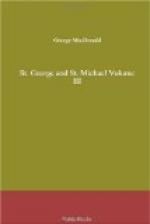He shulde of trouthe thilke grace (that same)
With all his hole herte embrace,
So that his word be trewe and pleine
Toward the world, and so certeine,
That in him be no double speche.
For if men shulde trouthe seche,
And found it nought within a king,
It were an unfittende thing
The worde is token of that within;
There shall a worthy king begin
To kepe his tunge and to be trewe,
So shall his price ben ever newe.’
’And here, sir, is what he saith as to the significance of the kingly crown, if your majesty will allow me to read it.’
‘Read on, my lord; all is good and true,’ said the king.
’The gold betokneth excellence,
That men shuld done him reverence,
As to her lege soveraine.
(their liege)
The stones, as the bokes saine,
Commended ben in treble wise.
First, they ben hard, and
thilke assise (that attribute)
Betokeneth in a king constaunce,
So that there shall be no
variaunce
Be found in his condicion.
And also by description
The vertue, whiche is in the
stones,
A verray signe is for the
nones
Of that a king shall ben honest,
And holde trewely his behest
(promise)
Of thing, which longeth to
kinghede.’ (belongeth)
’And so on—for I were loath to weary your majesty—of the colour of the stones, and the circular form of the crown.’
‘Read on, my lord,’ said the king.
Several passages, therefore, did the marquis pick out and read—amongst which probably were certain concerning flatterers—taking care still to speak of Alexander and Aristotle, and by no means of king and marquis, until at length he had ’read the king such a lesson,’ as Dr. Bayly informs us, ’that the bystanders were amazed at his boldness.’
’My lord, have you got your lesson by heart, or speak you out of the book?’ asked the king, taking the volume.
‘Sir,’ the marquis replied, ’if you could read my heart, it may be you might find it there; or if your majesty please to get it by heart, I will lend you my book.’
‘I would willingly borrow it,’ said the king.
‘Nay,’ said the marquis, ’I will lend it to you upon these conditions: first, that you read it; and, second, that you make use of it.’
Here, glancing round, well knowing the nature of the soil upon which his words fell, he saw ’some of the new-made lords displeased, fretting and biting their thumbs,’ and thus therefore resumed:—
’But, sir, I assure you that no man was so much for the absolute power of the king as Aristotle. If your majesty will allow me the book again, I will show you one remarkable passage to that purpose.’
Having searched the volume for a moment, and found it, he read as follows:—




